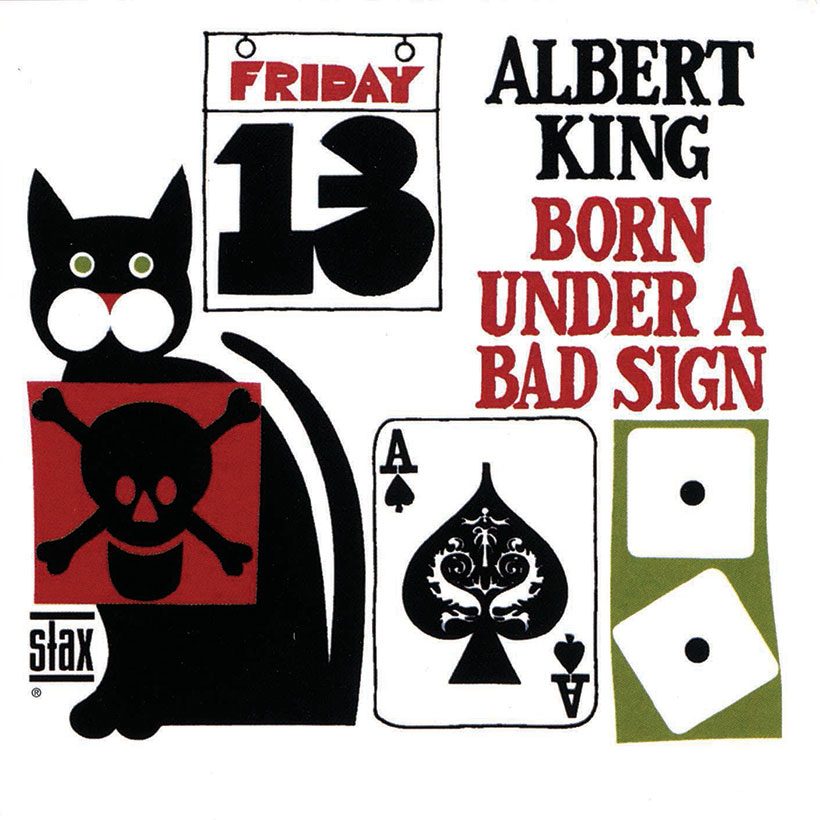‘Born Under A Bad Sign’: More Talent Than Luck For Albert King
If you haven’t heard Albert King’s ‘Born Under A Bad Sign’, it’s time for a change of luck. Go ahead, listen. It’ll make your day.

I’ve been down since I began to crawl
If it wasn’t for bad luck
I wouldn’t have no luck at all
– “Born Under A Bad Sign”
Simply one of the greatest blues choruses ever. It’s screaming: “Life don’t get much harder than this!” The funky, swinging bass line, perforated with defiant, almost haughty guitar licks, is a legendary piece of music. It’s one of those songs that people know as soon as they hear the instantly recognizable introduction – but it’s more likely to be the Cream version that they’ll have in mind. The band transformed the title track from Albert King’s Born Under A Bad Sign into a huge hit, helping the album Wheels Of Fire to the No.3 and No.1 chart positions in the UK and US, respectively, and producing the first-ever platinum-selling double-album.
Listen to Born Under A Bad Sign right now.
Those responsible for creating such a classic song were Booker T. Jones, who wrote the music and that brilliant 6+5-note bass riff, and Stax R&B singer William Bell, who wrote the lyrics. Or did he? The words to “Born Under A Bad Sign” are similar to Lightnin’ Slim’s “Bad Luck,” from 1954, and it’s hard to imagine Bell’s lyrics were a coincidence.
Lord, if it wasn’t for bad luck
Lightnin’ wouldn’t have no luck at all
You know bad luck has been followin’ poor Lightnin’
Ever since I began to crawl
Truth is, the blues is riddled with similar phrases and riffs popping up all over the place. It’s a sort of living library, and Lightnin’ Slim’s words may have lodged in Bell’s subconscious, ready to be “borrowed” at the right moment in time.
“Born Under A Bad Sign” has since been recorded separately for Stax Records by Booker T. & The MGs, on their 1968 album Soul Limbo, and by William Bell on Bound To Happen, in 1969. It’s also been covered by everyone from Jimi Hendrix to Paul Butterfield, Etta James, Big Mama Thornton, Buddy Guy with Koko Taylor, Robben Ford, and Rita Coolidge. But no version comes close to the one that kicks off Albert King’s mighty Born Under A Bad Sign album, released in August 1967.
If you want the real soul of the song, a true soul-blues – the one that echoes in those desperately dispirited words, then Albert King’s version has got to be the one.
Much of the soulfulness on Born Under A Bad Sign (the album) is contributed by Booker T & The MGs, the Stax house backing band, with Steve Cropper on rhythm guitar, Booker T Jones playing organ and piano, Isaac Hayes on piano, Donald “Duck” Dunn on bass guitar, Al Jackson Jr., on drums, Wayne Jackson on trumpet, Andrew Love on tenor saxophone, and Joe Arnold on baritone saxophone and flute. And, of course, King’s pin-prick note bending: a hark back to his early influences, and especially the slide playing of Blind Lemon Jefferson. King’s funky phrasing came from hours and hours of listening to T-Bone Walker and Lonnie Johnson, but you’ll hear a lot of BB King vibrato and economy of playing in there too. One of the “Three Kings Of The Blues Guitar” (along with BB and Freddie), Albert claimed to be BB’s half-brother, so perhaps it’s no surprise their playing is familiar.
All the cuts on Born Under A Bad Sign are excellent and get a consistent treatment, producing one of King’s most balanced releases. The album was certainly appreciated by the public, charting on the Billboard Top 50. Other songs needing a mention include the rather racy 12-bar blues “Crosscut Saw” (“Now, I’m a crosscut saw, drag me ’cross yo’ log”), recorded as early as 1941 by Delta bluesman Tommy McClennan, which King restyles with intoxicating Latino shuffle and a tight horn arrangement. “The Hunter” also serves up something special, ready for the pot and as trademark Booker T & The MGs as “Green Onions”. It’s a pulsating stew of a track on a high flame, tasty and nourishing.
“Kansas City” is firmly back in King territory, with lovely drum kicks and horn lifts to the rhythm. It’s a light and elegant touch, before “Oh, Pretty Woman” enters and it all gets muscular again: pulsating, rippling and sexy. And so it continues, without a weakling within hearing distance.
If you have already been fortunate enough to have heard this most excellent of albums, then count your lucky stars. If you haven’t, then it’s clearly time for a change of luck. Go ahead, give it a listen. Born Under A Bad Sign will make your day.












